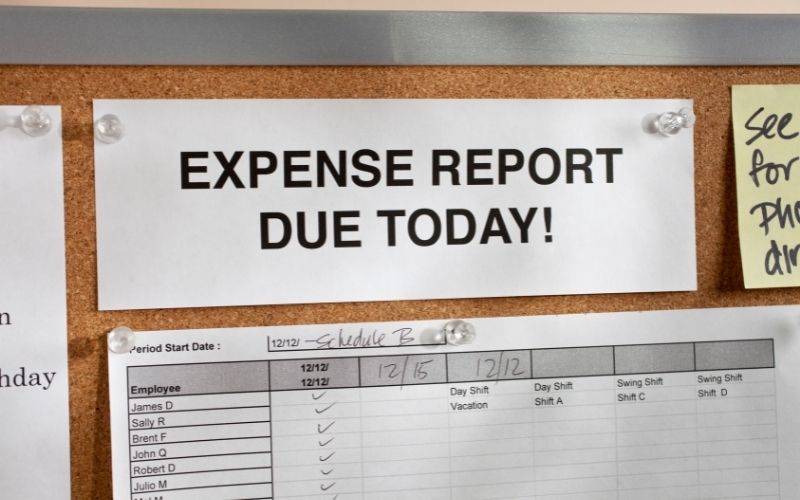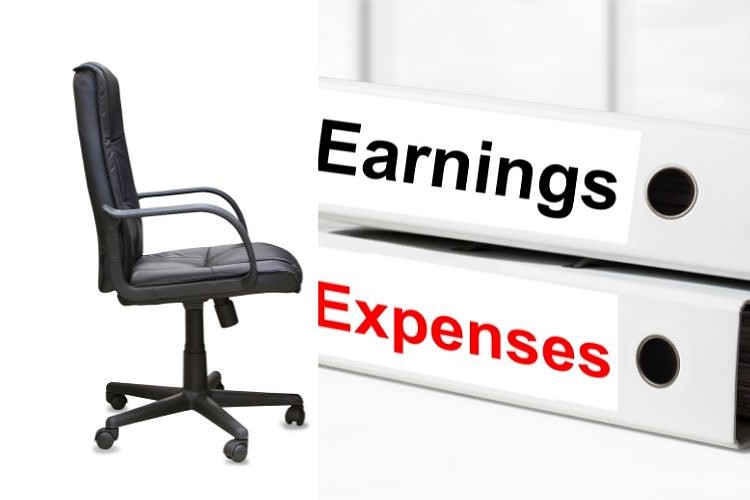Accounting for office equipment is not as straightforward as most people may think. Knowing when to treat it as either an asset or an expense is often confusing.
And we know you have many questions such as, “What kind of expense is an office chair?” or “Is office furniture tax-deductible?”
However, once you learn the basic rules for recording them in your books, you will find it easier to classify them into proper accounts.
Today, we will go over how to treat office equipment such as office chairs. Upon reading this article, you will have a better understanding of the accounting rules for such items.
Office equipment that does not meet a company’s capitalization threshold is considered an expense and is presented on the Income Statement. These include computers, copier machines, and furniture, such as desks, and office chairs. Most office equipment that is not capitalized is classified as administrative or other expenses.
Table of Contents
Can you expense a home office chair?
The COVID19 pandemic has forced most employees to refrain from commuting to offices unless necessary. As a result, many people have resorted to setting up temporary workplaces in their homes.
While working close to home has its advantages, it doesn’t necessarily provide people with the proper office equipment and furniture they would normally have access to in an office. Because of this, you may have bought new items such as an office chair out of your pocket.
You may be wondering, ‘Can I expense a home office chair?’
The short answer is yes. Because office furniture is necessary for business operations, you can treat a home office chair as a business expense.
However, you can only claim a home office chair as a deduction on your taxes if you are self-employed. We will discuss this further later.
What kind of expense is an office chair?

Office chairs, when expensed outright, fall under the Administrative or Other Expenses category.
Administrative expenses are costs that are necessary for maintaining a company’s daily operations and administering its business. These are overhead costs, ones that are not directly attributable to the production of goods or services.
A company incurs administrative expenses regardless of whether it produces or sells anything. On the Income Statement, these expenses appear under Cost of Goods Sold and are included in determining net profit or loss.
Other examples of administrative expenses are fixed costs, including rent, utilities, insurance, salaries, and office supplies.
Is a desk chair an office expense or an asset?

A desk chair is considered a fixed asset and presented on the Balance Sheet if its useful life is over one year and if it meets or exceeds a business’s capitalization threshold. Otherwise, it will be considered a regular expense or an Income Statement item.
For example, if the capitalization limit of a company is $1,000 and the cost of a desk chair is $250, then it can be expensed outright. However, if it costs $1,200, then it should be recorded as an asset and depreciated over its useful life.
Accounting standards or policies do not mandate the capitalization threshold. Companies set the limit internally based on regular practices.
For instance, if a business regularly purchases office equipment such as a desk chair and sells it within a year, then it should classify it as a current asset, particularly inventory. To determine the best practices for tax reporting and bookkeeping, we recommend that you consult with an accountant.
There are several reasons why a company would prefer treating a desk chair as an expense rather than an asset. For one, some businesses try to limit the amount of record-keeping for long-term assets that need to be valued over time, while others do so to report higher net profits in the succeeding years.
Can I claim an office chair on tax?

If you are an employee or a business owner, chances are you’ve been working from home due to pandemic restrictions since early 2020. And because the COVID19 cases continue to rise, perhaps you will be forced to work from home indefinitely.
You may have already turned your room into a permanent working space or set up a dedicated area in your home. Either way, you must have purchased new equipment, including an office chair.
You’re probably wondering, ‘Can I claim an office chair on tax?’
Before 2018, home office expenses are generally tax-deductible as miscellaneous items. However, due to the Tax Cuts and Jobs Act (TCJA), that is no longer the case.
From 2018 through 2025, you will only be able to deduct your home office expenses from your taxable income if you are self-employed with an annual income of over $600, also known as a 1099 contractor. Office employees who work from home due to the pandemic can no longer claim such expenses as deductions.
Freelancers, and other self-employed individuals who worked part-time or for a few months, can qualify for the home office deduction. However, independent contractors will still need to satisfy the following qualifications:
- The part of your home where you work must be regularly and exclusively used for business.
It can be your basement or old garage, but it can’t be any common area your family members also use. It can be a desk in your bedroom that is dedicated to working only.
The IRS does not have any specific requirements such as room dimensions, but your designated workplace has to be an exclusive area. It also doesn’t have to be a place where you only work. It can also be a place where you do administrative tasks.
- For a space to be considered an office, you must use it for business regularly or at least weekly. You may still work from other places such as coffee shops, but your primary work location must be your home workstation.
For instance, if you are a real estate agent who is constantly running between client calls, meetings, and open houses, you can still claim a home office deduction. However, if your job has little need for computer work or doesn’t require you to work from home most of the time, then your expenses do not qualify.
- It is unnecessary for office equipment such as an office chair to be used continuously throughout the year to be tax-deductible.
For example, a freelancer who worked on a consulting job for six months can still claim the home office deduction.
- You cannot claim home office expenses as deductions along with other office space costs.
For instance, if you are already deducting a studio lease from your taxable income, you cannot claim additional home office expenses.
For more information about home office deductions, visit the IRS website.
What are other examples of home office expenses?
Apart from office equipment and furniture, the following items may also be deductible, partially or in full:
- Rent
- Insurance
- Utilities such as electricity, gas, water, trash removal
- Phone and Internet bill
- Home depreciation, property taxes, and mortgage interest
When deducting other home office expenses such as rent, you can use either of two methods, Standard and Simplified.
When using the Standard option, you can deduct 100% of your expenses or a percentage that corresponds to the area of your home that is dedicated as a workspace. For instance, you can deduct 10% of your rent or utilities if your workstation occupies that portion of your home.
With the Simplified option, you no longer need to keep track of your expenses. Instead, you can opt to deduct $5 per square foot of your home office setup for a maximum deduction of $1,500.
Watch this video to learn more about the difference between the Standard and Simplified methods.
Conclusion
Because of the grave effects of the global pandemic, the number of people working from home in the US and worldwide increased significantly in the past year. As a result, workers had to set up offices within their homes, converting simple desks to workstations.
The pandemic has also greatly impacted the country financially, and many families are suffering from loss or reduction of income and are struggling with paying bills. Because of this, many workers take advantage of tax-deductible expenses as much as they can.
Fortunately, some people are eligible for home office deductions.
Home office deductions are valuable and can increase your after-tax income if used. They are available to independent contractors and small businesses, but many freelancers fail to claim these deductions due to misunderstandings, including rumors of increased audit probability.
Now that you know what home office expenses are, you should take advantage of the deductions if you are eligible. Deductions are meant to benefit taxpayers and should be availed of.
If you need expert advice, you can always reach out to a Certified Public Accountant.

My name is Vance, and I am the owner of To Ergonomics. Our mission is to improve your workflow by helping you create a supportive and welcoming environment. We hope that you’ll find what you’re looking for while you’re here.

